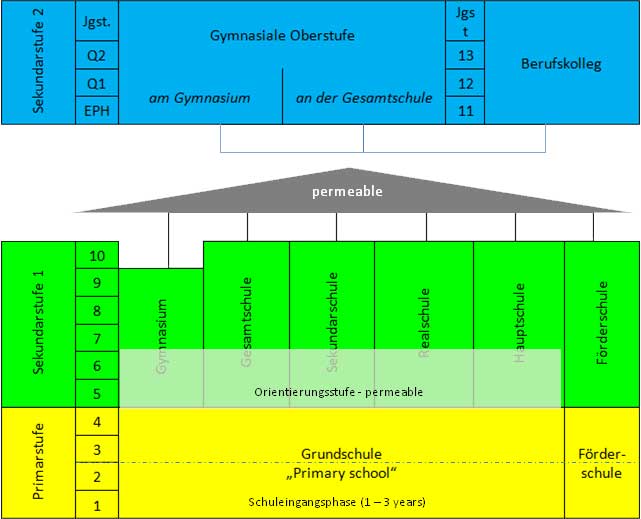Germany: 16 states - 16 school systems
The responsibility for the German education system lies primarily with the states (16 Bundesländer) while the federal government plays only a minor role. Education is the responsibility of the states (Länder) and part of their constitutional sovereignty (Kulturhoheit der Länder).
School systems differ from state to state!
North-Rhine Westphalian (=NRW) school system

School system North Rhine Westphalia (NRW) - Germany
North Rhine Westphalia (=NRW) optional Kindergarten (nursery school) education is offered to all children between three and six years of age, after which school attendance is compulsory. Most children go to kindergarten for at least three years. Parents have to pay for it, while school is free. Currently, it is planned to provide the last year before school at no costs. Children, however, first attend Grundschule (=primary school) from the age of six for normally 4 years.
Primary school starts with the “Schuleingangsphase” (school beginning phase). Normally children stay in this phase for 2 years, but it can be as one or three years as well, depending on the individual state of development. Every school board can decide how the Schuleingangsphase is organized: Pupils being educated in mixed age or in separate classes.
At the end of class 4 teachers give a so-called educational (path) recommendation (Bildungs(gang)empfehlung) based on achievements in the main subjects (mathematics, German, natural sciences, foreign language) and classroom behavior. Parents can choose the secondary school – Hauptschule, Realschule, Gymnasium and Gesamtschule and new since 2011 Sekundarschule.
In Hauptschule, Realschule and Gymnasium grades 5 and 6 form an orientation phase (Orientierungsstufe) during which pupils, their parents and teachers decide which of the above-mentioned paths the pupils should follow. This orientation phase is embedded into the program of the secondary schools. Phase I from secondary schools last 5-6 years.
After that good students have the chance to attend Phase II secondary to reach the Fachholschulreife or as higher degree Abitur. In order to enter university, students are, as a rule, are required to have passed the Abitur examination; since 2009, however, those with a Meisterbrief (master craftman's diploma) have also been able to apply. Those wishing to attend a "university of applied sciences" must, as a rule, have Abitur, Fachhochschulreife or a Meisterbrief.
The school year starts after the summer break (different from state to state, usually end/mid of August) and is divided into two terms. At the end of every school year children get reports and marks. Starting wirh grade 3 marks are given with every term (end of January and summer).
There are typically 12 weeks of holidays in addition to public holidays. In NRW there are generally 6 weeks of summer, 2 weeks of autumn (the former "harvest holiday", where farmers used to need their children for field work), two weeks of Christmas holiday and two weeks in spring (usually around Easter Sunday) free.
Subjects and organization of Primary School in NRW
Subject
|
Schuleingangsphase
|
3rd grade
|
4th grade
|
|
German, Sachkunde, mathematics, remedial teaching
|
12
|
14-15
|
15-16
|
|
crafts and music
|
3-4
|
4
|
4
|
|
English
|
1-2
|
2
|
2
|
|
Religious education
|
2
|
2
|
2
|
|
Physical educations
|
3
|
3
|
3
|
|
Lessons* per week
|
21-22
|
25-26
|
26-27
|
Children start to learn English in second half of first school year.
Lessons are on 5 days/week. Lessons are normally before lunch time from about 8 am to 13.30 am. After lessons many children can stay at school – called Offener Ganztag. Here they have a warm lunch, do their homework and take part in some activities.